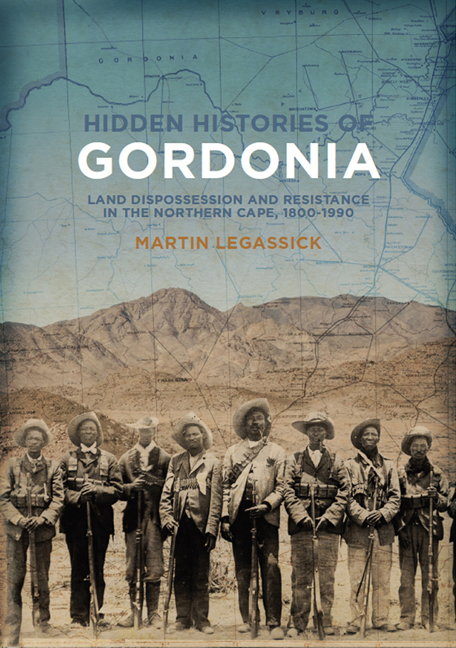Book contents
- Frontmatter
- Dedication
- Contents
- Acknowledgements
- Acronyms and abbreviations
- Illustrations
- Preface
- Chapter 1 The prehistory of Gordonia
- Chapter 2 The Baster settlement of Gordonia and its decline
- Chapter 3 The will of Abraham and Elizabeth September: a struggle for land in Gordonia, 1898–2014
- Chapter 4 From prisoners to exhibits: representations of Bushmen of the northern Cape, 1880–1900
- Chapter 5 South African human remains and the politics of repatriation: reconsidering the legacy of Rudolf Pöch
- Chapter 6 The early history of the brown Afrikaners in Riemvasmaak
- Chapter 7 The battle of Naroegas
- Chapter 8 The Marengo rebellion and Riemvasmaak, 1903–1907
- Chapter 9 The racial division of Gordonia, 1921–1930
- Chapter 10 Keidebees and Blikkies locations, Upington, 1894–1974
- Chapter 11 ‘All my powers have been swallowed by Upington’: the life and times of Alfred Gubula
- References
- Index
Chapter 9 - The racial division of Gordonia, 1921–1930
Published online by Cambridge University Press: 20 April 2018
- Frontmatter
- Dedication
- Contents
- Acknowledgements
- Acronyms and abbreviations
- Illustrations
- Preface
- Chapter 1 The prehistory of Gordonia
- Chapter 2 The Baster settlement of Gordonia and its decline
- Chapter 3 The will of Abraham and Elizabeth September: a struggle for land in Gordonia, 1898–2014
- Chapter 4 From prisoners to exhibits: representations of Bushmen of the northern Cape, 1880–1900
- Chapter 5 South African human remains and the politics of repatriation: reconsidering the legacy of Rudolf Pöch
- Chapter 6 The early history of the brown Afrikaners in Riemvasmaak
- Chapter 7 The battle of Naroegas
- Chapter 8 The Marengo rebellion and Riemvasmaak, 1903–1907
- Chapter 9 The racial division of Gordonia, 1921–1930
- Chapter 10 Keidebees and Blikkies locations, Upington, 1894–1974
- Chapter 11 ‘All my powers have been swallowed by Upington’: the life and times of Alfred Gubula
- References
- Index
Summary
In this chapter we return to the issue of dispossession of Baster land. In 1921 a petition signed by 259 Baster men from Gordonia was submitted to parliament. They asked parliament ‘to restore our previous rights in the settlement of Gordonia’ given by the imperial government ‘in perpetual Erfpacht’. A demand for restitution of land, the petition would be reinterpreted by successive South African governments in line with policies of segregation. It catalysed, in fact, the racial division of Gordonia.
In the Gordonia settlement, Basters had been granted farms along the north bank of the Orange River as well as in the interior of the country. Subsequently, they had lost most of this land (see chapters 2 and 3). Basters told a Lands Department official in 1921 they were ‘finding it practically impossible to find places where they can pursue their calling, which is agricultural farming, and even when they do succeed in securing places where they can live, their form of tenure is very insecure… [causing] them a great deal of inconvenience and financial loss’. Moreover their tenancies were threatened, wrote the Rand Daily Mail, because ‘Europeans… more and more require their land for their own use’. The petitioners blamed the loss of the land on government. Under the original regime, they claimed, land alienation was prohibited to persons not registered as citizens (who were mainly Basters). So far as they knew, these rights had been ratified when Gordonia was annexed to British Bechuanaland. (This was partly incorrect: their original titles had been recognised but were now subject to a free market in land.) But after annexation farms were sold by public auction, including to people previously ineligible. Because their forefathers had been even less educated than they were now, they had not paid attention to this violation of the conditions. They had trusted that the government would defend them. But having now seen the original documents, the petitioners were amazed that the sale of the farms had been allowed. Even those who had sold their property, they claimed, wondered why they had never been warned by officials when these transactions were registered.
- Type
- Chapter
- Information
- Hidden Histories of GordoniaLand dispossession and resistance in the Northern Cape, 1800–1990, pp. 265 - 316Publisher: Wits University PressPrint publication year: 2016



